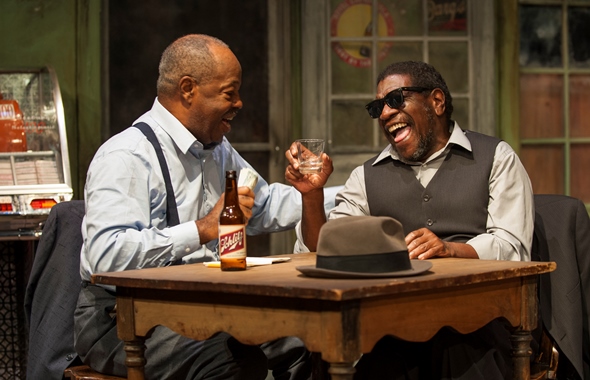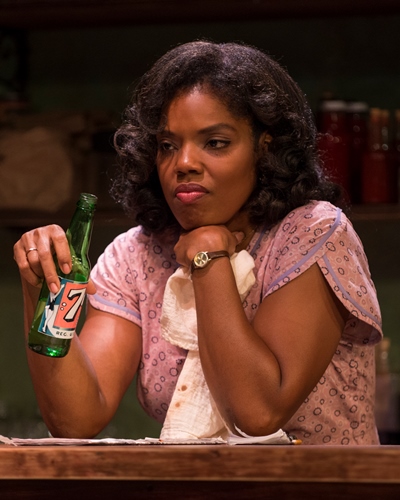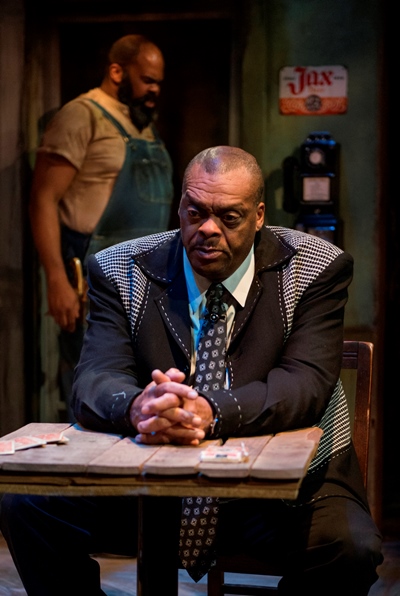‘East Texas Hot Links’ at Writers: A small café, some laughs, some fear; and then some blood
 Review: “East Texas Hot Links” by Eugene Lee, at Writers Theatre through Jan. 22, 2017. ★★★★★
Review: “East Texas Hot Links” by Eugene Lee, at Writers Theatre through Jan. 22, 2017. ★★★★★
By Lawrence B. Johnson
Eugene Lee’s lyrical tragedy “East Texas Hotlinks” is an exquisite song of betrayal, an ironic ballad of the enemy within. And it is pitch perfect in a fluent, wryly comedic and quite astonishing production directed by Ron OJ Parson at Writers Theatre.
 The grace and truth of August Wilson’s poetic style permeate the characters as well as the language of Lee’s 1991 play, a reflection of this playwright-actor’s long association with the Wilson canon. Like each of Wilson’s plays, “East Texas Hot Links” is set in a place and time of specific meaning to an African-American community. But here the topography is rural rather than urban, the circumstance the oppressive Southern world of Jim Crow circa 1955.
The grace and truth of August Wilson’s poetic style permeate the characters as well as the language of Lee’s 1991 play, a reflection of this playwright-actor’s long association with the Wilson canon. Like each of Wilson’s plays, “East Texas Hot Links” is set in a place and time of specific meaning to an African-American community. But here the topography is rural rather than urban, the circumstance the oppressive Southern world of Jim Crow circa 1955.
Yet if the habitués of one modest refuge, the Top ’o the Hill Café, are beleaguered by a white society where the Ku Klux Klan both makes the rules for black people and also metes out punishment, these poor folk with a lust for life are far from broken. The café – a masterpiece of detailed naturalism by designer Jack Magaw — may offer little more than a beer and a deck of cards, and some peel-your-tongue hooch on a good night, but there’s life and friendship folded into that small space, even a qualified sense of safety.
 Of course, there’s also the proprietress Charlesetta, whose late father established the café but proved way too generous toward needful patrons to ever make much of a profit. The only woman in sight, Charlesetta (Tyla Abercrumbie) is a striking, earthy sort of peach, everybody’s sweetheart and beholden to none. In a robust, good-humored turn, Abercrumbie draws the eye whenever she speaks.
Of course, there’s also the proprietress Charlesetta, whose late father established the café but proved way too generous toward needful patrons to ever make much of a profit. The only woman in sight, Charlesetta (Tyla Abercrumbie) is a striking, earthy sort of peach, everybody’s sweetheart and beholden to none. In a robust, good-humored turn, Abercrumbie draws the eye whenever she speaks.
Charlesetta doesn’t even have to speak to get the attention of randy young Roy Moore, whose persistent, plain-spoken propositions Kelvin Roston, Jr. serves up to everyone’s amusement, not least ours below the footlights. Old-timers like the soft-spoken Columbus Frye (Alfred Wilson) and the imposing, shotgun-wielding Buckshot (Antoine Pierre Whitfield) remember Charlesetta’s father and view her through more protective eyes.
Then there’s Adolph, the Professor, whose eyes see nothing, not since he was blinded in the war. But time was when he used his sight in the service of his mind. Impressively well read, Adolph is a one-man Greek chorus, drawing his pointed commentary from an array of literary sources. Willie B.’s expansive and luminous Adolph roundly earns the shots Charlesetta keeps pouring him from a fresh jug of clear shine.
 Enter Boochie Reed, a gambler, and from all appearances a successful one — a man of substantial form, good clothes and sober mien. Boochie (rock-solid, no-nonsense A.C. Smith) is the playwright’s most direct link back to the populace of August Wilson. He is a seer, a palm reader; it’s a gift he’s always had. When Boochie spots a bad omen, he doesn’t require payment, which means his forecast for Delmus Green, a young guy who’s been anxiously bouncing around the café this night, is free.
Enter Boochie Reed, a gambler, and from all appearances a successful one — a man of substantial form, good clothes and sober mien. Boochie (rock-solid, no-nonsense A.C. Smith) is the playwright’s most direct link back to the populace of August Wilson. He is a seer, a palm reader; it’s a gift he’s always had. When Boochie spots a bad omen, he doesn’t require payment, which means his forecast for Delmus Green, a young guy who’s been anxiously bouncing around the café this night, is free.
Delmus (Luce Metrius) is waiting for word from the boss of the crew laying a new highway. He has a pretty girl on the string and he really needs a paying job. The café’s remaining occupant is the laconic and solitary XL Dancer (Namir Smallwood), who works on the road gang. A favorite of the boss, XL has put in a good word for Delmus. He even tells the kid that the boss is coming to the cafe to meet him personally. But the man hasn’t shown. Delmus is impatient. When is he coming?
 In Smallwood’s low-key but decidedly edgy presence, XL becomes an increasingly magnetic character. He sits apart, playing solitaire. The café regulars don’t dislike him, but in a spiritual as well as physical way, he never enters the circle of their banter. There’s been new trouble on the outside, and something seems to be going down tonight. XL at least appears to have some sense of it.
In Smallwood’s low-key but decidedly edgy presence, XL becomes an increasingly magnetic character. He sits apart, playing solitaire. The café regulars don’t dislike him, but in a spiritual as well as physical way, he never enters the circle of their banter. There’s been new trouble on the outside, and something seems to be going down tonight. XL at least appears to have some sense of it.
Still, amid these hardscrabble lives, you can’t be sure who’s into what. When the peace, the figurative security, of the Top o’ the Hill Café is suddenly blown to pieces, the ruining hand is not the one that might seem poised to strike. A fissure in this little commune opens like a gaping of the earth. And the wounds inflicted are beyond the salving powers of all the clear whiskey in East Texas.
Related Links:
- Performance location, dates and times: Details at TheatreinChicago.com
- Preview of complete 2016-17 season at Writers Theatre: Read it at Chicago On the Aisle
Tags: A.C. Smith, Alfred Wilson, East Texas Hot Links, Eugene Lee, Jack Magaw, Kelvin Roston Jr., Luce Metrius, Namir Smallwood, Ron OJ Parson, Tyla Abercrumbie, Willie B., Writers' Theatre


2 Pingbacks »